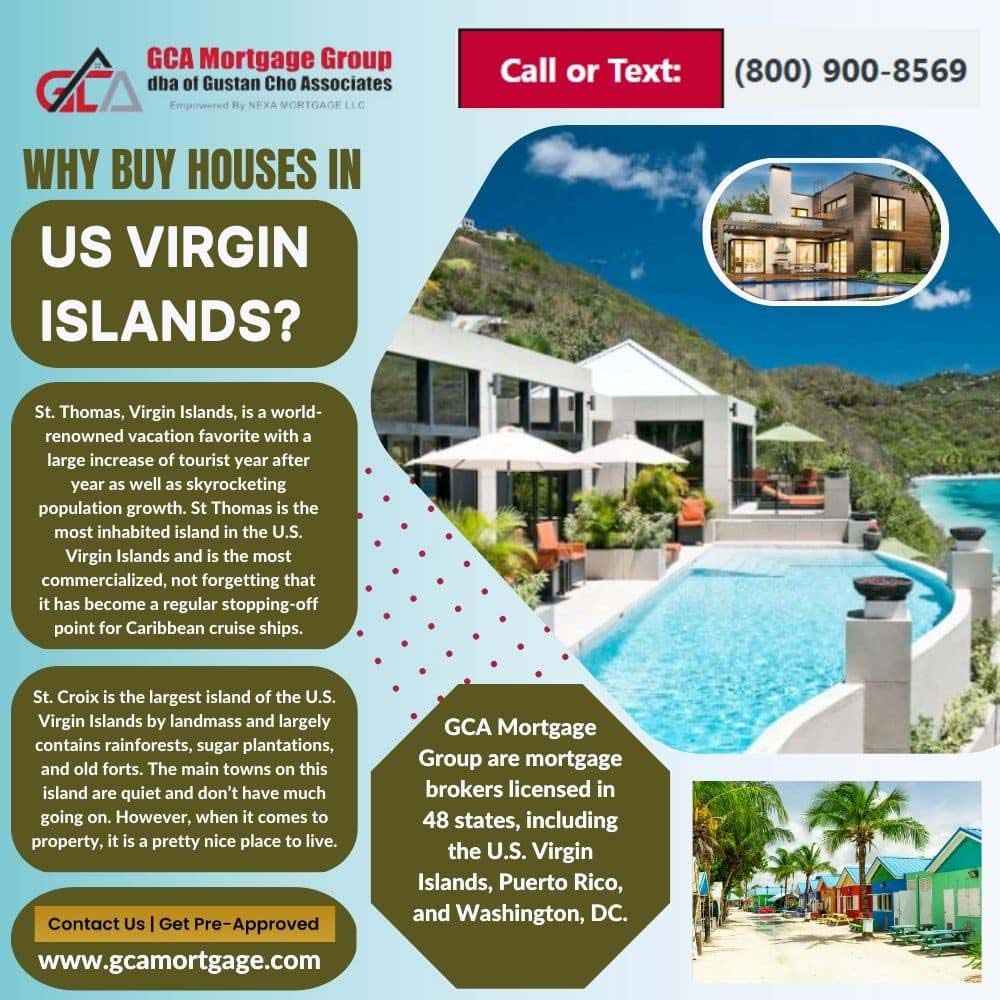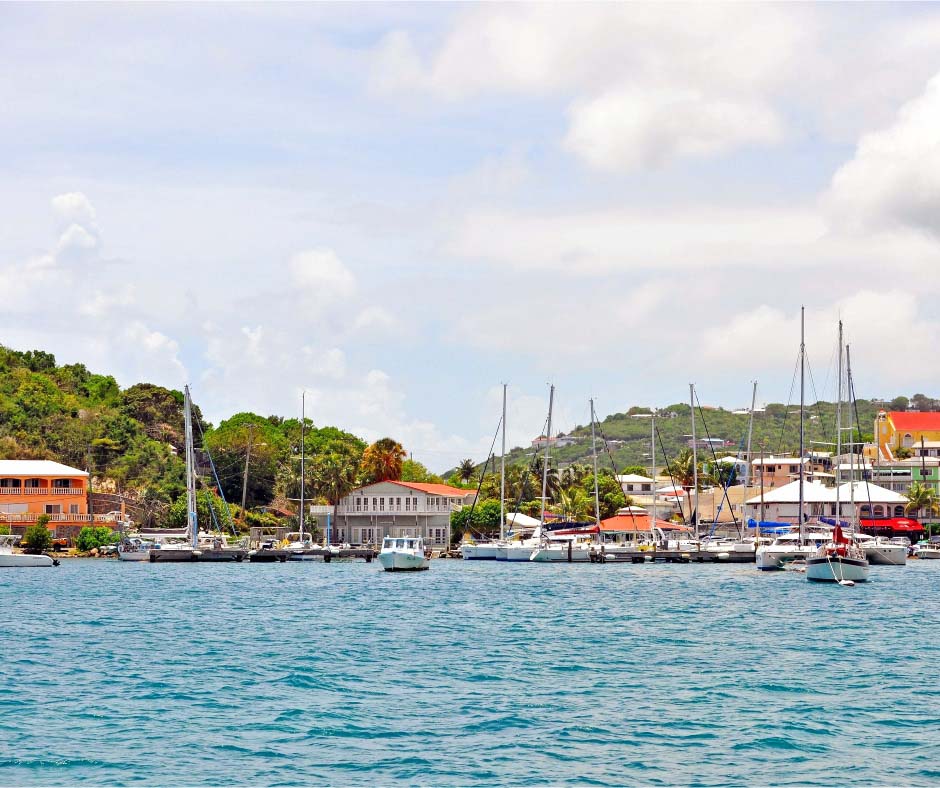

In this guide, we will cover getting a mortgage in the Virgin Islands for a home purchase with a U.S.-based mortgage lender. In recent years, the Virgin Islands have seen an unprecedented boom in tourism. The growth of new people and businesses moving to the Virgin Islands has been explosive. More and more real estate investors are buying property in the United States Virgin Islands.

Getting a mortgage in the Virgin Islands has become easier since U.S.-Based mortgage lenders have made a presence in the U.S. Virgin Islands. Prior to the U.S.-based mortgage brokers making a large presence in the U.S. Virgin Islands, most homebuyers and real estate investors have been relying at local banks for getting a mortgage in the Virgin Islands.
In the past decade, much money started trickling into the island through investments and tourism. This means that even the hospitality industry has directly benefited from this boom and, thereby, has created opportunities for all. Even cruise ships from all over the world have been docking on the island’s beaches. With increased tourism, the property market has also massively improved, as many tourists settle on the island. In this article, we want to look at why buying a property on the Virgin Islands could be the best decision, plus how you should go about it. We will also cover getting a mortgage in the Virgin Islands.

Table of Contents Click Here

Real estate investors buying rental properties in the U.S. Virgin Islands benefit from the high occupancy rates on rentals. Getting a mortgage in the Virgin Islands is easy for real. One of the considerations for real estate investors is how you will manage the property. When buying an investment property in the U.S. Virgin Islands, you must consider how to manage it.
There are several property management firms, as well as other experienced managers, who could help you actualize your dream of owning a rental property in this paradise.
Property owners need to market their rental properties if they have vacancies. Marketing rental properties have become much easier with social media and digital marketing technology. Compared to a few decades ago, marketing rental property in the U.S. was hard. Property owners didn’t use it to reach a wider audience.
Marketing has become easy with websites like Airbnb, VBRO, and HomeAway. All you need to do is create an account on these websites and begin marketing. Since everyone is there, you can also market the property on social media. And if you are looking to rent on the islands, you should head to these platforms to find a property that suits your needs.

This section will cover getting a mortgage in the Virgin Islands on rental properties. You should know that a mortgage is always available from local lenders.
Most things on the islands are the same as that on the U.S. mainland, which means that when it comes to mortgages, not only will you be able to get a mortgage, but you can also apply for all the types of mortgages in the U.S., including FHA, VA, Jumbo loans, conventional mortgages and many more.
Get the needed help – if you are a renter looking for an apartment on the island, you should get help from local property agents, who would help you find the best property in an ideal location on the islands – based on your needs, of course.
One frequently asked question by property buyers is where you should look for properties on the islands. When you come to the U.S. Virgin Islands looking for property and areas to invest in, you want to be in the best locations. So, here are the best places you buy or rent property on the islands.

St. Thomas, Virgin Islands, is a world-renowned vacation favorite with a large increase of tourist year after year as well as skyrocketing population growth. St Thomas is the most inhabited island in the U.S. Virgin Islands and is the most commercialized, not forgetting that it has become a regular stopping-off point for Caribbean cruise ships. John Strange of Gustan Cho Associates, explains the landscape of St. Thomas, Virgin Islands.
The island of St. Thomas, Virgin Islands is approximately 30 square miles and does have the most beautiful turquoise water and jungle cliffs, which makes it quite beautiful.
St. Thomas, Virgin Islands, is one of the world’s most popular vacation destinations. St. Thomas has a wide range of restaurants, entertainment, and other fun activities, which makes the island overrun by tourists eager to get a piece of it. When it comes to the property market on the island, you will find properties of all kinds, from luxury mansions to condos and villas. Even smaller properties for smaller families are plentiful, and actually, these range from 150,000 USD to 250,000 USD, which is good value for money.
St. Croix is the largest island of the U.S. Virgin Islands by landmass and largely contains rainforests, sugar plantations, and old forts. The main towns on this island are quiet and don’t have much going on. However, when it comes to property, it is a pretty nice place to live. Many homes sit on large pieces of land, which means you not only get the home but also land you can cultivate. You will also find many schools, medical centers, and shopping centers. This is the place to be for people searching for a quiet life on the U.S. Virgin Islands.
The U.S. Virgin Islands is one of the best places to buy property in the U.S., and based on how the property market is growing, you’d better act earlier than later. Gustan Cho Associates are mortgage brokers licensed in 48 states, including the U.S. Virgin Islands, Puerto Rico, and Washington, DC. One of Our Loan Officer said the following about getting a mortgage in the Virgin Islands with a lender with no overlays on government and conventional loans that offer hundreds of non-QM mortgage loan options.
Over 80% of our borrowers are folks who could not qualify at other mortgage companies due to lender overlays or because the lender did not have the mortgage loan option best suited for the borrower.
Properties are plenty in the islands, especially St. Croix and St. Thomas, and quite affordable. This might no longer be the case in the future. If you need assistance, you can hire a local property agent and a resourceful mortgage broker with a proven track record and a wide network of contacts. If you are looking getting a mortgage in the Virgin Islands, please get in touch with us at Gustan Cho Associates at 262-627-1965 or text us for a faster response. You can also email us at gcho@gustancho.com. The team is available seven days a week, evenings, weekends, and holidays.

Yes, non-residents can buy property in the Virgin Islands. Foreign ownership of real estate is not restricted.
Various types of mortgages are available, including:
Down payment requirements usually range from 10 to 30 percent of the selling price, depending on the type of mortgage and the lender’s qualifications.
The process generally involves:
Typical documents include:
Your credit score significantly determines your mortgage eligibility and the interest rate you’ll receive. Higher credit scores generally lead to better loan terms and lower interest rates.
Special programs for first-time homebuyers include FHA loans and local programs that provide down payment assistance and favorable terms for eligible buyers.
Interest rates vary based on the type of mortgage, the lender, and the borrower’s creditworthiness. Exploring various lenders and comparing their rates is crucial to securing the best deal possible.
Yes, there are property taxes in the Virgin Islands. The rates can vary depending on the island and the property’s assessed value.
Yes, eligible veterans can use VA loans to buy a home in the Virgin Islands. VA loans provide advantages like zero down payment and attractive interest rates.
The average time frame for closing on a mortgage in the Virgin Islands is 30 to 45 days, depending on the mortgage provider and the transaction specifics.
Yes, consider the following:
Research and compare lenders based on the following:
Closing costs typically include:
Yes, you can get a mortgage for a vacation home or investment property in the Virgin Islands. However, the terms and requirements may differ from those for a primary residence, and lenders may require a larger down payment.